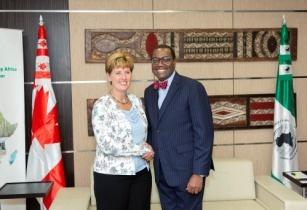On her first visit to Cote d’Ivoire, Canada’s minister of international development, Marie-Claude Bibeau and the president of the African Development Bank (AfDB) Akinwumi Adesina shared a common vision and commitment to the advancement of women and girls on the continent
Bibeau, Adesina and other senior management members exchanged views on wide-ranging issues including gender empowerment issues, renewable energy, agriculture, and innovative financing mechanisms.
Canada is the fourth largest contributor to the bank among non-regional members and the sixth largest donor to the African Development Fund (ADF), the concessional arm of the AfDB.
The minister emphasised the need to involve African women in decision-making processes.
“If we want to end poverty, women in Africa must be able to develop their full potential,” Bibeau said. She also expressed the hope that women would no longer be perceived as “mere beneficiaries” but as “agents of change.”
“This is the approach we are taking in Canada. We are working to ensure that 15 per cent of our department's budget is allocated to transformative projects for women,” Bibeau said.
The gender strategy is a central part of AfDB’s ambitious vision for Africa, based on the reality that gender equality is integral to Africa’s economic and social development. The vision includes creating opportunities for women, disadvantaged and marginalised people and communities so they can fully participate in and benefit from the development of their communities and nations.
Commending Adesina for his leadership, Bibeau acknowledged, “Change will not come overnight, but our collective actions will make a significant difference.” In 2017, AfDB approved US$8.7bn and more than US$7bn of disbursements, the highest performance since its creation in 1964.
From 2010 to 2017, AfDB’s operations have positively impacted the lives of millions of Africans. About 83mn Africans have benefited from improved access to transport, and 49mn n have gained access to clean water and sanitation. Nine million African women have been connected to electricity and the living conditions of 29mn more women have been significantly enhanced as a result of improvements in agriculture.
Adesina noted, “The bank plans to raise a US$300mn guarantee fund for the Affirmative Finance Action for Women in Africa (AFAWA) initiative.” AFAWA is expected to leverage about US$3bn over 10 years to empower female entrepreneurs through capacity building development, access to funding and policy, legal and regulatory reforms to support enterprises led by women.
The initiative provides significant support for the advancement of Africa’s Gender agenda. The bank is helping build women’s market programs in countries such as Kenya, Nigeria, Sierra Leone and the Democratic Republic of Congo. Through four commercial banks, at least 200,000 women-owned businesses are expected to be impacted through financing, growth in revenues and through coaching and mentoring programmes.





















